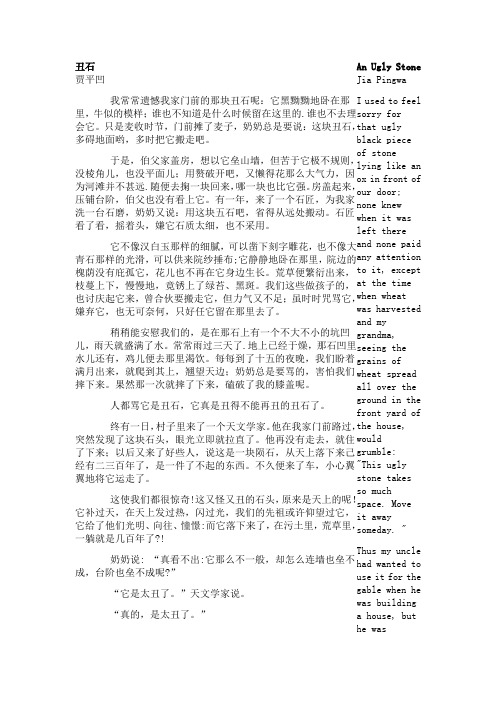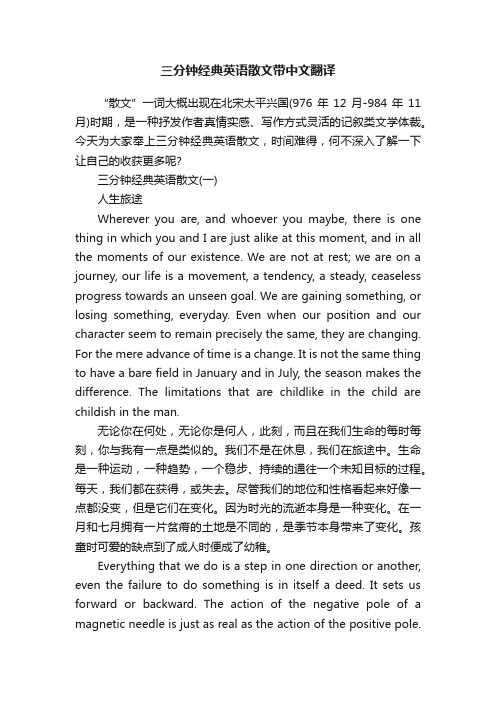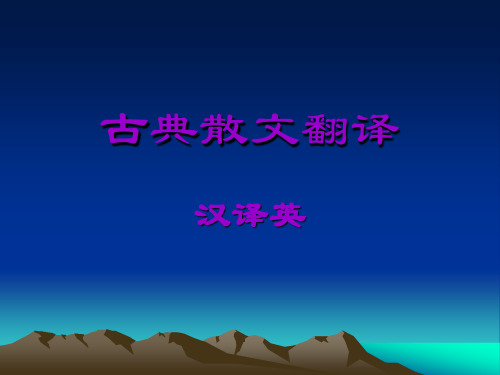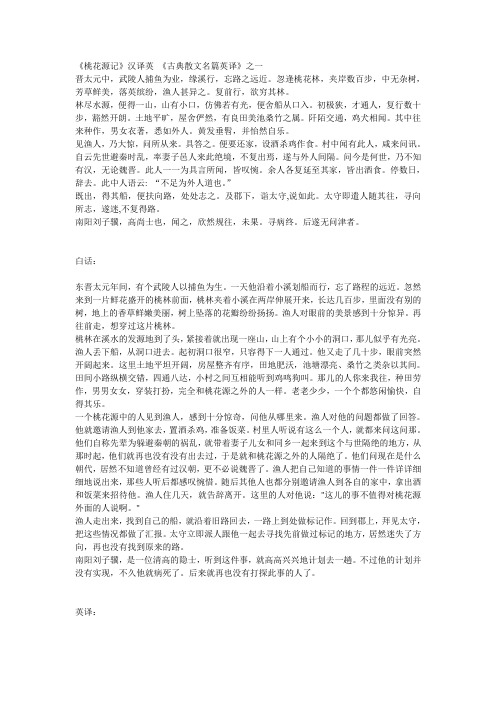古典散文翻译(汉译英)
经典散文翻译中翻英(精)

丑石贾平凹 我常常遗憾我家门前的那块丑石呢:它黑黝黝地卧在那里,牛似的模样;谁也不知道是什么时候留在这里的.谁也不去理会它。
只是麦收时节,门前摊了麦子,奶奶总是要说:这块丑石,多碍地面哟,多时把它搬走吧。
于是,伯父家盖房,想以它垒山墙,但苦于它极不规则,没棱角儿,也没平面儿;用赘破开吧,又懒得花那么大气力,因为河滩并不甚远.随便去掬一块回来,哪一块也比它强。
房盖起来,压铺台阶,伯父也没有看上它。
有一年,来了一个石匠,为我家洗一台石磨,奶奶又说:用这块五石吧,省得从远处搬动。
石匠看了看,摇着头,嫌它石质太细,也不采用。
它不像汉白玉那样的细腻,可以凿下刻字雕花,也不像大青石那样的光滑,可以供来院纱捶布;它静静地卧在那里,院边的槐荫没有庇孤它,花儿也不再在它身边生长。
荒草便繁衍出来,枝蔓上下,慢慢地,竟锈上了绿苔、黑斑。
我们这些做孩子的,也讨庆起它来,曾合伙要搬走它,但力气又不足;虽时时咒骂它,嫌弃它,也无可奈何,只好任它留在那里去了。
稍稍能安慰我们的,是在那石上有一个不大不小的坑凹儿,雨天就盛满了水。
常常雨过三天了.地上已经于燥,那石凹里水儿还有,鸡儿便去那里渴饮。
每每到了十五的夜晚,我们盼着满月出来,就爬到其上,翘望天边;奶奶总是要骂的,害怕我们摔下来。
果然那一次就摔了下来,磕破了我的膝盖呢。
人都骂它是丑石,它真是丑得不能再丑的丑石了。
终有一日,村子里来了一个天文学家。
他在我家门前路过,突然发现了这块石头,眼光立即就拉直了。
他再没有走去,就住了下来;以后又来了好些人,说这是一块陨石,从天上落下来己经有二三百年了,是一件了不起的东西。
不久便来了车,小心翼翼地将它运走了。
这使我们都很惊奇!这又怪又丑的石头,原来是天上的呢!它补过天,在天上发过热,闪过光,我们的先祖或许仰望过它,它给了他们光明、向往、憧憬:而它落下来了,在污土里,荒草里,一躺就是几百年了?!奶奶说: “真看不出:它那么不一般,却怎么连墙也垒不成,台阶也垒不成呢?” “它是太丑了。
古典散文文言文翻译

《桃花源记》陶渊明晋太元中,武陵人捕鱼为业。
缘溪行,忘路之远近。
忽逢桃花林,夹岸数百步,中无杂树,芳草鲜美,落英缤纷,渔人甚异之。
复前行,欲穷其林。
林尽水源,便得一山,山有小口,仿佛若有光。
便舍船,从口入。
初极狭,才通人。
复行数十步,豁然开朗。
土地平旷,屋舍俨然,有良田美池桑竹之属。
阡陌交通,鸡犬相闻。
其中往来种作,男女衣着,悉如外人。
黄发垂髫,并怡然自乐。
见渔人,乃大惊,问所从来。
具答之。
便要还家,设酒杀鸡作食。
村中闻有此人,咸来问讯。
自云先世避秦时乱,率妻子邑人,来此绝境,不复出焉,遂与外人间隔。
问今是何世,乃不知有汉,无论魏晋。
此人为具言所闻,皆叹惋。
余人各复延至其家,皆出酒食。
停数日,辞去。
此中人语云:“不足为外人道也。
”既出,得其船,便扶向路,处处志之。
及郡下,诣太守,说如此。
太守即遣人随其往,寻向所志,遂迷,不复得路。
南阳刘子骥,高尚士也,闻之,欣然规往。
未果,寻病终。
后遂无问津者。
译文:在晋朝太元年间,有个武陵人以捕鱼为生。
他沿着溪流行走,忘记了路程的远近。
忽然遇到一片桃花林,两岸相隔数百步,中间没有其他树木,花草鲜美,落花缤纷,渔人对此感到非常惊异。
他继续前行,想要探究这片林子的尽头。
林子的尽头是溪水的源头,那里有一座小山,山上有个小洞口,洞口仿佛透着光亮。
渔人便舍弃了船只,从洞口进去。
一开始非常狭窄,仅能容身。
又走了几十步,突然变得开阔明亮。
这里土地平坦,房屋整齐,有肥沃的田地、美丽的池塘、桑树和竹林等。
田间小路交错相通,鸡鸣犬吠声此起彼伏。
人们在其中往来耕种,男女的穿着打扮都和外界的人一样。
老老少少,都显得非常快乐。
他们见到渔人,非常惊讶,询问他从哪里来。
渔人详细回答了他们。
于是他们邀请渔人到自己家中,摆酒杀鸡款待。
村中的人听说有这样一个外乡人,都来打听消息。
他们自称祖先为了躲避秦朝的战乱,带着妻子儿女和乡邻们来到这个与世隔绝的地方,从此不再出去,因此与外界隔绝。
他们问现在是什么朝代,竟然不知道有汉朝,更不用说魏晋了。
汉英散文翻译

鸽子有凤头的,有黑翅的, 有纯白的,还有带芝麻点儿 The pigeons included 的。但,翅膀都同样的娇健。 phoenix-headed, black-
winged, pure white and even blacked-dotted, but their wings are all the same—very strong.
耐 力
Perseverance
A pigeon is flying in the air with a whistle tied to its leg. A melodious sonority(声音) can be heard in the air. The sky is blue with only one or two white drifting clouds. The pigeon hovers above. The twists and turns of the whistle sound caused by the somersaults(翻筋斗) of the pigeon can be heard, too.
几个女人羞红着脸告辞出来, 摇开靠在岸边上的小船.现 在已经快到晌午了,万里无 云,可是因为在水上,还有些 凉风.这风从南面吹过来,从 稻秧上苇尖吹过来,水面没 有一只船,水象无边的跳荡 的水银.
Shamed-faced and blushing, the women took their leave and rowed off again. It was nearly noon, without a cloud in the sky, but on the river was a breeze from the paddy fields and rushed in the south. There was the only boat afloat on the endless expanse of water like rippling quicksilver.
经典散文英语短篇附中文翻译

经典散文英语短篇附中文翻译中国六朝以来,为区别韵文与骈文,把凡不押韵、不重排偶的散体文章(包括经传史书),统称“散文”。
后又泛指诗歌以外的所有文学体裁。
今天为大家奉上经典散文英语短篇,时间难得,何不深入了解一下让自己的收获更多呢?经典散文英语短篇(一)转眼青春的散场青春的字眼慢慢的觉得陌生,年轮总是很轻易的烙下苍老的印记。
以为总是长久的东西,其实,就在转神与刹那间便不在身边了。
曾经深爱、思念着的人便轻易的变成了曾经熟悉的陌生人。
曾经纯真无邪,曾经美丽梦想,随着四季轮回慢慢的散尽……这就是青春,在岁月里的转身,从一个熟悉到另外一个陌生,再从陌生转变到熟悉,直至一场场的青春的帷幕渐渐的落幕。
在青春的酸甜苦乐里稚气里的幻想慢慢的褪去。
“Youth” seems to be fading away in my life, only leaving me some unforgettable and cherished memories. Something that we used to think would last forever in our lives, had actually vanished in a second before we realized it. Those who we used to deeply love or miss, have now become the most acquainted strangers. Our once pure and beautiful dream, is gradually fading away with time passing by……This is youth, which is indeed an endless cycle from familiarity to strangeness, and from strangeness to familiarity, until the curtain of our youth is closing off little by little, along with our childish fantasies.人就是这样一种奇怪的动物,拥有的时候厌倦,失去回首的时候才酸痛。
古代散文名篇英译1

1、岳阳楼记(宋)范仲淹庆历四年春,滕子京谪守巴陵郡。
越明年,政通人和,百废具兴。
乃重修岳阳楼,增其旧制,刻唐贤、今人诗赋于其上。
属予作文以记之。
予观夫巴陵胜状,在洞庭一湖。
衔远山,吞长江,浩浩汤汤,横无际涯;朝晖夕阴,气象万千。
此则岳阳楼之大观也。
前人之述备矣。
然则北通巫峡,南极潇湘,迁客骚人,多会于此,览物之情,得无异乎?若夫霪雨霏霏,连月不开,阴风怒号,浊浪排空;日星隐耀,山岳潜形;商旅不行,樯倾楫摧;薄暮冥冥,虎啸猿啼。
登斯楼也,则有去国怀乡,忧谗畏讥,满目萧然,感极而悲者矣。
至若春和景明,波澜不惊,上下天光,一碧万顷;沙鸥翔集,锦鳞游泳;岸芷汀兰,郁郁青青。
而或长烟一空,皓月千里,浮光跃金,静影沉璧,渔歌互答,此乐何极!登斯楼也,则有心旷神怡,宠辱偕忘,把酒临风,其喜洋洋者矣。
嗟夫!予尝求古仁人之心,或异二者之为,何哉?不以物喜,不以己悲;居庙堂之高则忧其民;处江湖之远则忧其君。
是进亦忧,退亦忧。
然则何时而乐耶?其必曰“先天下之忧而忧,后天下之乐而乐”乎。
噫!微斯人,吾谁与归?时六年九月十五日。
译文:Yueyang PavilionFan ZhongyanIn the spring of the fourth year of the reign of Qingli, Teng Zijing was banished from the capital to be governor of Baling Prefecture. After he had govern the district for a year, the administration became efficient, the people became united, and all things that had fallen into disrepair were given a new lease on life. Then he restored Yueyang Pavilion, adding new splendor to the original structure and having inscribed on it pomes by famous men of the Tang Dynasty as well as the present time. And he asked me to write an essay to commemorate this. Now I have found that the finest sights of Baling are concentrated in the region of Lake Dongting. Dongting, nibbling at the distant hills and gulping down the Yangtze River, strikes all beholders as vast and infinite, presenting a scene of boundless variety; and this is the superb view from Yueyang Pavilion. All this has been described in full by writers of earlier ages. However, since the lake is linked with Wu Gorge in the north and extends to the Xiao and Xiang rivers in the south, many exiles and wandering poets gather here, and their reactions to these sights vary greatly. During a period of incessant rain, when a spell of bad weather continues for more than a month, when louring winds bellow angrily, tumultuous waves hurl themselves against the sky, sun and stars hide their light, hills and mountains disappear, merchants have to halt in their travels, masts collapse and oars splinter, the day darkens and the roars of tigers and howls of monkeys are heard, if men come to this pavilion with a longing for home in their hearts or nursing a feeling of bitterness because of taunts and slander, they may find the sight depressing and fall prey to agitation or despair. But during mild and bright spring weather, when the waves are unruffled and the azure translucence above and below stretches before your eyes for myriads of li, when the water-birds fly down to congregate on the sands and fish with scales like glimmering silk disport themselves in the water, when the iris and orchids on the banks grow luxuriant and green; or whendusk falls over this vast expanse and bright moon casts its light a thousand li, when the rolling waves glitter like gold and silent shadows in the water glimmer like jade, and the fishermen sing to each other for sheer joy, then men coming up to this pavilion may feel complete freedom of heart and ease of spirit, forgetting every worldly gain or setback, to hold their winecups in the breeze in absolute elation, delighted with life. But again when I consider the men of old who possessed true humanity, they seem to have responded quite differently. The reason, perhaps, may be this: natural beauty was not enough to make them happy, nor their own situation enough to make them sad. When such men are high in the government or at court, their first concern is for the people; when they retire to distant streams and lakes, their first concern is for their sovereign. Thus they worry both when in office and when in retirement. When, then, can they enjoy themselves in life? No doubt they are concerned before anyone else and enjoy themselves only after everyone else finds enjoyment. Surely there are the men in whose footsteps I should follow!2、《项脊轩志》(节选) (明)归有光项脊轩,旧南阁子也。
三分钟经典英语散文带中文翻译

三分钟经典英语散文带中文翻译“散文”一词大概出现在北宋太平兴国(976年12月-984年11月)时期,是一种抒发作者真情实感、写作方式灵活的记叙类文学体裁。
今天为大家奉上三分钟经典英语散文,时间难得,何不深入了解一下让自己的收获更多呢?三分钟经典英语散文(一)人生旅途Wherever you are, and whoever you maybe, there is one thing in which you and I are just alike at this moment, and in all the moments of our existence. We are not at rest; we are on a journey, our life is a movement, a tendency, a steady, ceaseless progress towards an unseen goal. We are gaining something, or losing something, everyday. Even when our position and our character seem to remain precisely the same, they are changing. For the mere advance of time is a change. It is not the same thing to have a bare field in January and in July, the season makes the difference. The limitations that are childlike in the child are childish in the man.无论你在何处,无论你是何人,此刻,而且在我们生命的每时每刻,你与我有一点是类似的。
古典散文翻译(汉译英)

兰亭集序
(王羲之) 王羲之)
兰亭集序
永和九年,岁在癸丑。暮春之初,会於会 永和九年,岁在癸丑。暮春之初, 稽山阴之兰亭,修禊事也。群贤毕至, 稽山阴之兰亭,修禊事也。群贤毕至,少 长咸集。此地有崇山峻岭,茂林修竹。 长咸集。此地有崇山峻岭,茂林修竹。又 有清流激湍,映带左右,引以为流觞曲水。 有清流激湍,映带左右,引以为流觞曲水。 列坐其次,虽无丝竹管弦之盛,一觞一咏, 列坐其次,虽无丝竹管弦之盛,一觞一咏, 亦足以畅叙幽情。是日也,天朗气清, 亦足以畅叙幽情。是日也,天朗气清,惠 风和畅。仰观宇宙之大,俯察品类之盛, 风和畅。仰观宇宙之大,俯察品类之盛, 所以游目骋怀,足以极视听之娱, 所以游目骋怀,足以极视听之娱,信可乐 也!
By turning round the peak along a bending path there appears a tower standing like a perching bird above the fountain ?that is the Old Drunkard Tower. Who built the tower? A Buddhist monk, the Wise Immortal. Who gave it the name? The Prefect refers to himself. The Prefect comes to drink here with his guests. Only a little drinking will make him drunk; and being the eldest he therefore calls himself the old drunkard. The old drunkard is not interested in the wine, but in the hills and rivers. The joy of hills and rivers, found in the heart, mingles itself with the wine.
《桃花源记》汉译英

《桃花源记》汉译英《古典散文名篇英译》之一晋太元中,武陵人捕鱼为业,缘溪行,忘路之远近。
忽逢桃花林,夹岸数百步,中无杂树,芳草鲜美,落英缤纷,渔人甚异之。
复前行,欲穷其林。
林尽水源,便得一山,山有小口,仿佛若有光,便舍船从口入。
初极狭,才通人,复行数十步,豁然开朗。
土地平旷,屋舍俨然,有良田美池桑竹之属。
阡陌交通,鸡犬相闻。
其中往来种作,男女衣著,悉如外人。
黄发垂髫,并怡然自乐。
见渔人,乃大惊,问所从来。
具答之。
便要还家,设酒杀鸡作食。
村中闻有此人,咸来问讯。
自云先世避秦时乱,率妻子邑人来此绝境,不复出焉,遂与外人间隔。
问今是何世,乃不知有汉,无论魏晋。
此人一一为具言所闻,皆叹惋。
余人各复延至其家,皆出酒食。
停数日,辞去。
此中人语云: “不足为外人道也。
”既出,得其船,便扶向路,处处志之。
及郡下,诣太守,说如此。
太守即遣人随其往,寻向所志,遂迷,不复得路。
南阳刘子骥,高尚士也,闻之,欣然规往,未果。
寻病终。
后遂无问津者。
白话:东晋太元年间,有个武陵人以捕鱼为生。
一天他沿着小溪划船而行,忘了路程的远近。
忽然来到一片鲜花盛开的桃林前面,桃林夹着小溪在两岸伸展开来,长达几百步,里面没有别的树,地上的香草鲜嫩美丽,树上坠落的花瓣纷纷扬扬。
渔人对眼前的美景感到十分惊异。
再往前走,想穿过这片桃林。
桃林在溪水的发源地到了头,紧接着就出现一座山,山上有个小小的洞口,那儿似乎有光亮。
渔人丢下船,从洞口进去。
起初洞口很窄,只容得下一人通过。
他又走了几十步,眼前突然开阔起来。
这里土地平坦开阔,房屋整齐有序,田地肥沃,池塘漂亮、桑竹之类杂以其间。
田间小路纵横交错,四通八达,小村之间互相能听到鸡鸣狗叫。
那儿的人你来我往,种田劳作,男男女女,穿装打扮,完全和桃花源之外的人一样。
老老少少,一个个都悠闲愉快,自得其乐。
一个桃花源中的人见到渔人,感到十分惊奇,问他从哪里来。
渔人对他的问题都做了回答。
他就邀请渔人到他家去,置酒杀鸡,准备饭菜。
- 1、下载文档前请自行甄别文档内容的完整性,平台不提供额外的编辑、内容补充、找答案等附加服务。
- 2、"仅部分预览"的文档,不可在线预览部分如存在完整性等问题,可反馈申请退款(可完整预览的文档不适用该条件!)。
- 3、如文档侵犯您的权益,请联系客服反馈,我们会尽快为您处理(人工客服工作时间:9:00-18:30)。
As for the carriers on the road, the wayfarers taking rest under the trees, some shouting ahead and some score hehind, and others bent with burdens going to and fro without a break―these are visitors from Chu itself. To angle at the stream where the stream is deep and the fishes are fat; to brew the fountain water into wine where the water is delicious and the wine is clear; and with mountain game and wild vegetable placed before him in a confused manner―that is the Prefect at banquet.
By turning round the peak along a bending path there appears a tower standing like a perching bird above the fountain ?that is the Old Drunkard Tower. Who built the tower? A Buddhist monk, the Wise Immortal. Who gave it the name? The Prefect refers to himself. The Prefect comes to drink here with his guests. Only a little drinking will make him drunk; and being the eldest he therefore calls himself the old drunkard. The old drunkard is not interested in the wine, but in the hills and rivers. The joy of hills and rivers, found in the heart, mingles itself with the wine.
To illustrate, the sunrise dispersing the mists over the woods, and the return of clouds dimming the caves below the rocks―this is the alteration of light and shade, which represents the morning and everning in the mountains. Sweet smell emitting from the fresh wild grass; luxuriant shades made by the fine trees; the high, clear skies, windy and frosty; rocks standing out of receding water―these are the changes of the four seasons in the mountains. Going out in the morning and coming back in the evening, one finds each of the four seasons has its different scenery, and the pleasure is inexhaustible.
《兰亭集序》(林语堂译本) 兰亭集序》 林语堂译本)
The Orchid Pavilion
In the ninth year of the reign Yungho[A.D. 353] in the beginning of late spring we met at the Orchid Pavilion in Shanyin of Kweich'i for the Water Festival, to wash away the evil spirits. Here are gathered all the illustrious persons and assembled both the old and the young. Here are tall mountains and majestic peaks, trees with thick foliage and tall bamboos. Here are also clear streams and gurgling rapids, catching one's eye from the right and left. We group ourselves in order, sitting by the waterside, and drinking in succession from a cup floating down the curving stream;
醉翁亭记
若夫日出而林霏开,云归而岩穴暝, 若夫日出而林霏开,云归而岩穴暝, 晦明变化者,山间之朝暮也。 晦明变化者,山间之朝暮也。野芳发 而幽香,佳木秀而繁阴,风霜高洁, 而幽香,佳木秀而繁阴,风霜高洁, 水落而石出者,山间之四时也。 水落而石出者,山间之四时也。朝而 暮而归,四时之景不同, 往,暮而归,四时之景不同,而乐亦 无穷也。 ching the mountain, and the shadows of men being scattered in confusion―the Prefect, followed by his guests, is going back. In the shades of the groves warbling is heard up and down―the birds are enjoying themselves after the departure of the visitors. The birds enjoy mountains and woods, but understand not the pleasure of men; and men enjoy the pleasure of following the Prefect in excursion, but they know not what pleasure the Prefect enjoys. He who shares their pleasures in drunkenness, and when awake can relate it in writing―this is the Prefect. Who is the Prefect?―Ou-yang Hsiu of Lu Ling. 高级笔译指导: 醉翁亭记》 潘正英 英译: 潘正英)英译 高级笔译指导:《醉翁亭记》(潘正英 英译
The pleasure of revelry is music neither of string, no of bamboo. The shooters hitting the marks; the chessplayers scoring vitory; winecups and counters mixed together; and people sitting down and rising up with much noise―the guests are happy and merry. And amidst the crowd a man with a sallow face and white hair, being hardly able to stand firm―that is the Prefect made drunk.
醉翁亭记
至於负者歌於涂,行者休於树,前者呼, 至於负者歌於涂,行者休於树,前者呼, 后者应,伛偻提携,往来而不绝者, 后者应,伛偻提携,往来而不绝者,滁人 游也。临溪而渔,溪深而鱼肥;酿泉为酒, 游也。临溪而渔,溪深而鱼肥;酿泉为酒, 泉香而酒洌;山肴野蔌,杂然而前陈者, 泉香而酒洌;山肴野蔌,杂然而前陈者, 太守宴也。宴酣之乐,非丝非竹,射者中, 太守宴也。宴酣之乐,非丝非竹,射者中, 弈者胜,觥筹交错,起坐而喧哗者, 弈者胜,觥筹交错,起坐而喧哗者,众宾 欢也。苍颜白发,颓乎其中者,太守醉也。 欢也。苍颜白发,颓乎其中者,太守醉也。
兰亭集序
(王羲之) 王羲之)
兰亭集序
永和九年,岁在癸丑。暮春之初,会於会 永和九年,岁在癸丑。暮春之初, 稽山阴之兰亭,修禊事也。群贤毕至, 稽山阴之兰亭,修禊事也。群贤毕至,少 长咸集。此地有崇山峻岭,茂林修竹。 长咸集。此地有崇山峻岭,茂林修竹。又 有清流激湍,映带左右,引以为流觞曲水。 有清流激湍,映带左右,引以为流觞曲水。 列坐其次,虽无丝竹管弦之盛,一觞一咏, 列坐其次,虽无丝竹管弦之盛,一觞一咏, 亦足以畅叙幽情。是日也,天朗气清, 亦足以畅叙幽情。是日也,天朗气清,惠 风和畅。仰观宇宙之大,俯察品类之盛, 风和畅。仰观宇宙之大,俯察品类之盛, 所以游目骋怀,足以极视听之娱, 所以游目骋怀,足以极视听之娱,信可乐 也!
古典散文翻译
汉译英
醉翁亭记
(欧阳修) 欧阳修)
欧阳修
欧阳修(1007-1073),字永 欧阳修( ),字永 - ), 醉翁,又号六一居士。 叔,号醉翁,又号六一居士。北 宋卓越的文学家、史学家。 宋卓越的文学家、史学家。与韩 柳宗元、宋王安石、苏洵、 愈、柳宗元、宋王安石、苏洵、 苏轼、苏辙、曾巩合称“ 苏轼、苏辙、曾巩合称“唐宋八 大家” 大家”。欧阳修在我国文学史上 有着重要的地位。他继承了韩愈 有着重要的地位。他继承了韩愈 古文运动的精神 作为宋代诗文 的精神。 古文运动的精神。作为宋代诗文 革新运动的领袖人物 的领袖人物, 革新运动的领袖人物,他的文论 和创作实绩, 和创作实绩,对当时以及后代都 有很大影响。 有很大影响。
